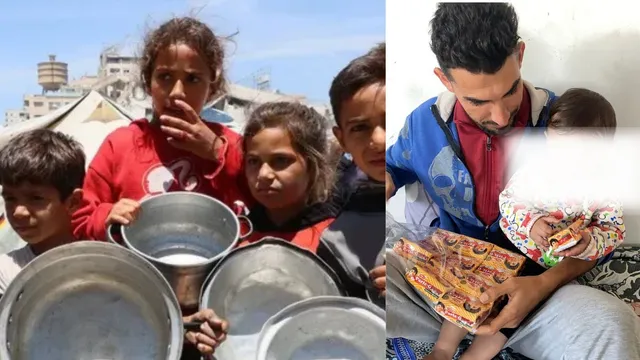- By Supratik Das
- Fri, 06 Jun 2025 02:32 PM (IST)
- Source:JND
In war-torn Gaza, where famine is deepening with each passing day, even the most basic food items have turned into luxury commodities. Parle-G, India’s one of the cheapest staples, a 5-rupee biscuit reportedly being sold for over 24 euros (Rs 2,342) a pack. A viral social media post from Gaza showed a father holding up the familiar yellow-and-white packet, saying, “After a long wait, I finally got Rafif her favorite biscuits today. Even though the price jumped from 1.5 Euros (Rs 146) to over 24 Euros (Rs 2,342), I just couldn’t deny Rafif her favorite treat.” The post sparked incredulity on social media, particularly among Indians who have grown up with Parle-G seeing it as a staple of tea-time, school tiffins, and affordable nutrition.
According to UN reports, the Integrated Food Security Phase Classification (IPC) platform stated that one in five individuals in Gaza, around 500,000 people, are experiencing starvation. “Goods indispensable for people’s survival are either depleted or expected to run out in the coming weeks… The entire population is facing high levels of acute food insecurity,” the UN stated. Essentials have skyrocketed in price. A sack of 25 kg wheat flour, say, now costs 235–520 USD (Rs 19,598– Rs 43,374), a staggering 3,000% price surge since February. UN Secretary-General António Guterres said he was shocked by the findings, particularly the sharp rise in hunger among children. Humanitarian agencies, such as the World Food Programme (WFP) and UNICEF, stated that hunger and malnutrition had been exacerbated since all aid was cut off from Gaza on March 2.
"The international community must respond quickly to get assistance pouring into Gaza once more," WFP head Cindy McCain said. "If we wait until a famine has been declared, it will already be too late for many." “It’s imperative that the international community acts urgently to get aid flowing into Gaza again,” WFP chief Cindy McCain said. “If we wait until after a famine is confirmed, it will already be too late for many people.” According to a NDTV report, commodities such as Parle-G, which purportedly came into Gaza as humanitarian assistance, are being routed into black markets and sold at exorbitant prices. Dr. Khaled Alshawwa, a surgeon in Gaza City, said to NDTV, "These commodities typically come into Gaza as free-of-charge humanitarian aid. But only a small percentage get them. Shortage makes them expensive black market commodities." Dr. Alshawwa said he himself purchased a pack of Parle-G for ₹240 earlier, close to 50 times the Indian price. "Prices vary in different areas based on who is controlling the flow," he explained.
After a long wait, I finally got Ravif her favorite biscuits today. Even though the price jumped from €1.5 to over €24, I just couldn’t deny Rafif her favorite treat. pic.twitter.com/O1dbfWHVTF
— Mohammed jawad 🇵🇸 (@Mo7ammed_jawad6) June 1, 2025
A list obtained by NDTV from Northern Gaza states,
• 1 kg of sugar costs about Rs 4,914
• 1 litre of cooking oil costs Rs 4,177
• 1 kg of potatoes costs Rs 1,965
• 1 kg of onions costs Rs 4,423
• 1 cup of coffee costs Rs 1,800
Even these fundamental goods are beyond the reach of the average Gaza family.
ALSO READ: Greta Thunberg, Game Of Thrones Actor Join Aid Ship Sailing To Gaza, Netizens Say 'Leave Her There'
3,700 Children Suffering Acute Malnutrition: UN
According to a report in The Guardian, Gaza's food crisis descended into chaos following the expiration of a temporary truce at the beginning of March. In a matter of hours, Israel shut down food, fuel, and medicine, exacerbating already critical shortages. The 47 community kitchens in Gaza, which provided basic meals such as lentils, rice, and pasta, are now under threat of closing down after running out of all stored supplies. "There is nothing more to give them now," a senior UN official said. "When the last of the supplies run out, the kitchens will need to shut down," they stated. The UN in March spotted 3,700 children with acute malnutrition, an 80 per cent increase from February. At the same time, Gaza hospitals are swamped and short-staffed. The International Committee of the Red Cross (ICRC) raised alarms over severe shortages of sterile gloves, drugs, and even shrouds. "This is an acute challenge as we continue to see shockingly high numbers of sick and wounded," it said.
ALSO READ: Israeli Attack Near GHF Aid Center Kills 30 In Rafah, Over 115 Injured: Reports

